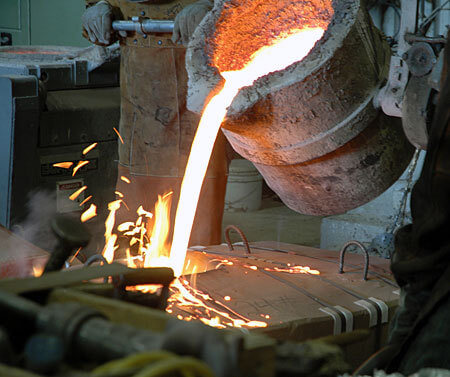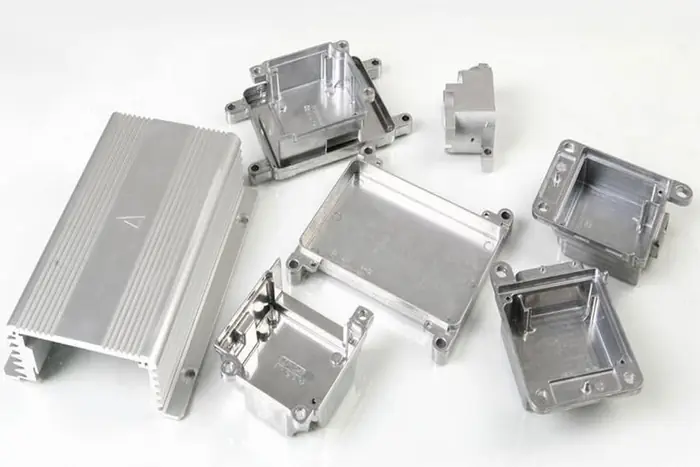Exploring Aluminum Foundry operations that maintain top-tier casting results
Wiki Article
A Comprehensive Overview to Selecting the Right Shop Services for Your Job Requirements
Selecting the right factory services is crucial for the success of any type of task. Each casting technique-- sand casting, financial investment spreading, and die spreading-- has unique benefits. Understanding these choices aids in making informed choices. Product selection, manufacturing capacities, and high quality guarantee are key aspects to think about. Furthermore, reviewing costs can affect lasting viability. Precision aluminum casting. What aspects should assist this decision-making process?Comprehending the Different Sorts Of Shop Services
While the world of shop services may seem complicated initially glance, comprehending the different kinds can greatly improve the production procedure. Shops usually concentrate on casting steels, and the major kinds consist of sand casting, investment casting, die casting, and centrifugal casting.Sand casting involves producing molds from sand and is optimal for huge components or low-volume production. Investment casting, on the other hand, provides high precision for elaborate styles, making it appropriate for aerospace or medical applications. Pass away spreading, identified by forcing molten metal into mold and mildews under high stress, is efficient for mass production of smaller parts.
Centrifugal casting makes use of rotational force to distribute molten metal, producing solid, cylindrical elements. Each service type has unique benefits and is chosen based upon specific task needs. Recognizing these distinctions enables manufacturers to select the most appropriate shop service, ultimately enhancing efficiency and product quality.
Key Variables to Take Into Consideration in Material Selection
Picking the proper material for shop solutions is an important action that affects the overall success of a task. Secret consider product choice include mechanical buildings, thermal resistance, and rust resistance - aluminum casting. Understanding the designated application and its requirements is crucial; materials need to hold up against operational stresses while preserving honesty graduallyAnother crucial consideration is the product's compatibility with the picked manufacturing procedure, as some materials are much better suited for certain techniques. Cost-effectiveness likewise plays a substantial function, as spending plan constraints can restrict options.

Lastly, accessibility and preparation of products can impact project timelines, making it needed for job supervisors to analyze these factors completely. By very carefully evaluating these components, one can assure a much more effective and reliable factory service experience.
Analyzing Manufacturing Abilities and Technologies
Exactly how successfully a factory can satisfy project specifications hinges on its manufacturing capacities and modern technologies. A thorough assessment of these components is crucial for job success. Production capabilities incorporate the shop's capability to deal with varying task timelines, complexities, and sizes. Recognizing the factory's equipment and equipment is crucial, as contemporary technologies such as computer system mathematical control (CNC) machining and advanced mold-making strategies can substantially improve precision and performance.Furthermore, the shop's use innovative materials and procedures, such as 3D printing or lost foam spreading, can provide benefits relating to design adaptability and cost-effectiveness. It is likewise important to examine the factory's ability to range production, making certain that they can fit future increases sought after without jeopardizing quality. By meticulously examining these elements, project supervisors can make informed choices about which shop is finest suited to satisfy their particular manufacturing requirements and technical expectations.
Importance of Quality Guarantee in Metal Casting
Quality control stands as an important pillar in the steel spreading sector, ensuring that every component meets rigorous specifications and requirements. This procedure involves systematic tracking and analysis of each stage of production, from preliminary layout to last inspection. Executing extensive top quality guarantee methods enhances the reliability and performance of cast elements, minimizing the chance of defects that can compromise structural stability.In addition, effective quality control promotes depend on in between shops and customers, as adherence to high standards represents dedication to quality. It likewise minimizes costly rework and delays, streamlining manufacturing procedures. By identifying possible issues early, top quality guarantee not only safeguards the end product but also adds to constant renovation within the foundry's procedures. Inevitably, focusing on high quality assurance in steel spreading is crucial for attaining client complete satisfaction and maintaining an one-upmanship in the industry.
Evaluating Cost-Effectiveness and Spending Plan Restrictions
While traversing the intricacies of factory services, reviewing cost-effectiveness and budget plan constraints arises as a crucial aspect for businesses. Recognizing the overall price of ownership involves greater than just the first price; it calls for an evaluation of long-term expenditures, including products, labor, and operational efficiencies. Firms ought to ask for comprehensive quotes that lay out all prospective prices, allowing a more clear comparison in between different factories.Additionally, organizations should evaluate their certain project requirements versus budget plan limitations. This includes assessing the compromises in between reduced expenses and possible effects on top quality, lead times, and reliability. It is essential to think about whether the chosen shop provides scalable options that can accommodate future requirements without substantial financial stress. By meticulously stabilizing cost elements with job objectives, firms can make informed decisions that enhance both budget plan and efficiency, making certain effective outcomes for their foundry jobs.
Often Asked Concerns
Exactly How Can I Make Certain Prompt Distribution of My Foundry Project?

What Accreditations Should a Factory Provider Have?
A trusted foundry company ought to possess qualifications such as ISO 9001 for top quality administration, ISO 14001 for environmental monitoring, and industry-specific accreditations that demonstrate compliance with safety and security and performance standards relevant to the spreading process.
Can I Visit the Shop Before Making a Choice?
Yes, checking out the factory before deciding is commonly a good idea. This enables potential clients to analyze the facility, meet the group, and guarantee that the solutions line up with their particular task requirements and criteria.What Is the Common Lead Time for Custom-made Castings?
The common preparation for customized spreadings ranges from 4 to twelve weeks, depending on the intricacy of the design, product specifications, and the shop's capability. Prompt communication can frequently expedite the procedure.How Do Factories Handle Style Changes During Manufacturing?
Factories typically aluminum casting fit design adjustments during production by applying versatile procedures. They evaluate the influence on timelines and costs, communicate with clients, and readjust process to guarantee high quality while minimizing interruptions to the manufacturing schedule.
Report this wiki page